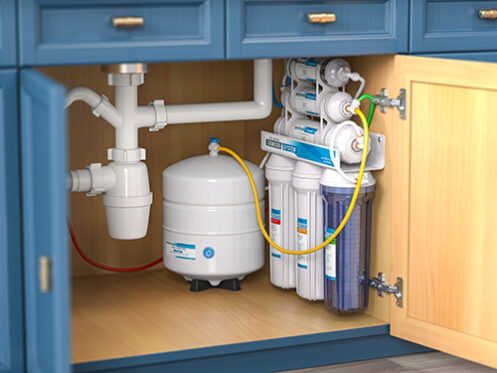The term “reverse osmosis” is probably something you haven’t heard since high school science class, but it may be more relevant to your life as a homeowner than you think. Reverse osmosis technology is used in a variety of water filtration systems, and having a reverse osmosis water treatment system in your home can provide you with great-tasting, highly filtered water straight from your sink.
Today, we’ll be covering everything you need to know about reverse osmosis water treatment systems — including what makes them tick, how they can improve your water and how they stack up against other types of water filtration systems.
What is reverse osmosis?
When a plant draws water molecules through the soil around it into its roots, that is a type of osmosis. In the process of passing through the plant’s roots, most of the soil is filtered out so that the plant receives mostly water.
Reverse osmosis is simply the reverse of this process. In reverse osmosis water treatment systems (RO systems), water that contains contaminants is filtered through a membrane in the system with pores just large enough for water molecules to pass through. As water passes through the membrane, contaminants are removed, leaving only pure filtered water behind.
What contaminants can a reverse osmosis water treatment system remove?
Every RO system has three cylindrical canisters — a sediment and carbon prefilter housing, a reverse osmosis membrane housing and an activated carbon post-filter housing — that are attached to a manifold. The sediment and carbon prefilter housing eliminates large sediment chunks and contaminants that could clog or damage the reverse osmosis membrane. The reverse osmosis membrane housing is where the magic happens. The activated carbon post-filter housing acts as a failsafe and polisher, removing any last bits of sediment and making the water more palatable.
- Lead
- Arsenic
- Copper
- Nitrates
- Nitrites
- Chromium
- Selenium
- Fluoride
- Sodium
- Cadmium
- Phosphate
- Radium
- Chlorine
- Barium
- Bacteria
- Cysts
- Viruses
How reverse osmosis water treatment systems stack up against other water filtration systems
If you have soft water or are willing to install a water softener along with an RO system, then RO systems are almost always a good bet. They create water that’s ideal for both cleaning and drinking.

Call us today!
If you’re interested in installing an RO system in your home, Delta Mechanical is here to help. For over 30 years we’ve been providing our customers with world-class plumbing, repiping and water treatment installation services. Contact us to learn more about what our experts can do for you.
To explore all our plumbing services, visit our site today. And be sure to check out our online specials!


